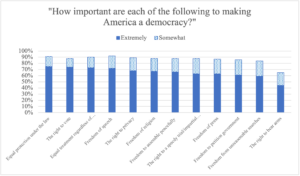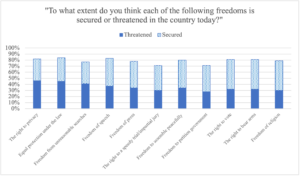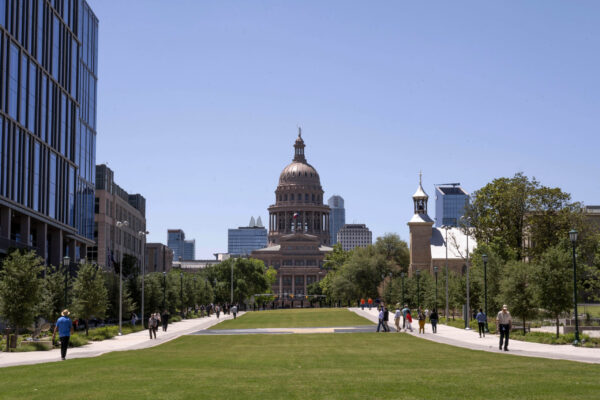AUSTIN, Texas — The inaugural American Civic Life Survey conducted by the Civitas Institute at The University of Texas at Austin has revealed that many Americans are concerned about the state of democracy. The survey, conducted from April 24 to May 1, encompassed a wide range of questions about democracy, capitalism, First Amendment rights, political actors and institutions, and issue priorities.
“There is general agreement among Americans that the country’s founding principles remain correct and appropriate,” said Daron Shaw, Civitas Institute faculty fellow and the Frank C. Erwin, Jr. Centennial Chair of State Government who helped lead the survey. “But the poll shows that citizens are skeptical about the ability of our leaders and institutions to protect and sustain those principles.”
YouGov provided data collection, and the institute will continue to conduct similar surveys twice yearly for three years.
When asked about the effectiveness of democracy in the United States, 46% offered a positive assessment of democracy in the U.S., while 39% gave it a negative rating, and 16% said it was neither good nor bad.
The survey also reveals a divide in economic issues facing the United States. On the American economic system, 49% gave positive assessments of capitalism and the free enterprise system, whereas 32% offered negative ratings and 17% gave it a middling rating.
However, the Americans surveyed do agree on a fundamental principle: The rights and liberties outlined in the Bill of Rights are important to democracy. All told, 11 of the 12 rights or liberties show at least 80% rating them as either somewhat or extremely important. Only the right to bear arms falls below this marker, with 65% rating it as important.

The right to privacy is viewed as the most threatened right. By 10 percentage points, Americans are more likely to say that the right to privacy is more “threatened” than “secured.” Other rights that are viewed as more threatened than secured are equal protection under the law (by 6 points) and freedom from unreasonable searches (by 5 points). The most secured rights are freedom of religion (19 percentage points more secured than threatened), the right to bear arms and the right to vote (17 points each) and the freedom to petition the government (15 points).

When asked to rate (using a 1-7 scale) how well the rights of Americans are taught to K-12 students, respondents gave the highest marks for the right to vote (39% scored the schools at the high end of the scale), followed by freedom of speech (33%), freedom of religion (30%), freedom to assemble peacefully (29%), and freedom of the press (29%). Fewer than a quarter gave positive marks for freedom from unreasonable searches or arrests (21%), the right to a speedy trial with an impartial jury (23%), and freedom to petition the government (24%).
The Civitas Institute aims to further explore these findings and engage in discussions with policymakers, scholars and citizens to foster a better understanding of the challenges and opportunities facing American democracy. American Civic Life Survey results can be found here. The approximately 1,200 panelists included in this survey were invited based on their age, gender, race and education, in proportion to the U.S. Census Bureau’s American Community Survey. Responding panelists are then weighted according to their demographics, voter registration status and 2016 presidential vote. Respondents identified as 28% liberal, 30% conservative and 33% moderate.




